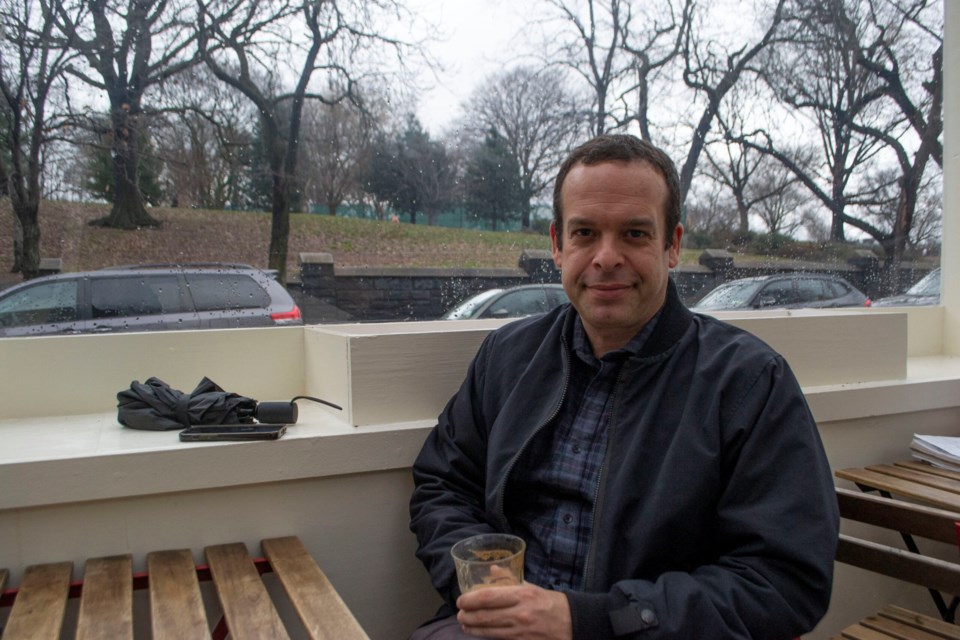Eight decades after six million Jews were murdered in the Holocaust, the tragedy is fading from living memory at an alarming rate, with few survivors now around to tell their stories.
For young people today, the atrocity can seem like an artifact of distant history, even amid rising anti-Semitism in the United States.
But Brooklynite Oren Schneider grew up in the shadow of the tragedy of the Holocaust, hearing stories about it in his childhood.
Schneider, whose father passed away when he was young, was raised by his grandparents —both survivors of the Holocaust who migrated to Israel in the aftermath of World War II. And, while growing up in Israel in the 1980s and 1990s, Schneider recorded hours of conversations with his grandfather about the things he survived.
After his grandfather passed away in 2020, Schneider finally found the purpose for those recordings: To use for a book aimed at young people telling the story of the Holocaust from the perspective of his grandfather, Alexander Rosenberg.
Schneider's book, “The Apprentice of Buchenwald: The True Story of the Teenage Boy who Sabotaged Hitler’s War Machine,” is set to be published on Jan. 27, which is International Holocaust Remembrance Day.
The book is based heavily on those stories Schneider was told by his grandfather over the decades.
"Growing up close to him, he shared a lot," Schneider said.
"And he always wanted to tell his story. He tried to make it age appropriate. He wasn't always successful. And growing up was very, very surprising to me to know that not all families alike had Holocaust survivors. And not everyone talked about it.”
Schneider said he’s not even really sure why he thought to begin making recordings of his grandfather at such a young age.
"I must have felt that this is something very precious that's not going to be there forever and that someday — I don't know when, I don't know for what purpose — these would be useful, whether it's for me or for the next generations," he said.
The idea to turn his grandfather’s story into a book, Schneider said, came during the pandemic shutdowns in 2020 — he said his grandfather died at the very beginning of that period after “a beautiful, long, full life.”
"I played back all of our recordings, and I sort of heard his voice telling his stories again. And I knew that it was just the right time."
He said the book was written with much thought given to the teenage and young adult audiences that may not know about the Holocaust.
The story-- which opens with Rosenberg’s life in Czechoslovakia before and during the rise of Nazi Germany and fascism in Europe-- describes how Rosenberg, sentenced to "death by work" at the Buchenwald concentration camp in Weimar, Germany, became part of a network of assembly line workers who intentionally sabotaged German weapons.
"The story itself is just very, very special," Schneider said.
"It focuses less about the history and the terrible figures that people talk about, or the mechanics of annihilation, and more about, like a very human story, one family of one person that found their way out and lifted him."
Schneider said he settled on a book for a young adult audience by asking himself how his grandfather would write the story.
“I remember him coming to my classroom, it was third grade or fourth grade back in Israel, and him sitting down, [simplifying] the story, telling young kids and enabling them to understand the events of the previous decades in a way that didn't put terror in their hearts, but really focused them on sort of what people do when they go into difficult situations and how they team up, how they collaborate to overcome these challenges.”
And he connected his grandfather’s story to many of the world’s current political issues — some of which, he said, echo the past.
"Things that are happening around us with a wave of radicalism that we're seeing everywhere. It's a slippery slope," he said.
"History is always repeating itself and will always repeat itself. Since that’s the nature of history, I think the difference could be in education — if we're able to educate the next generation, to be getting people to learn history to make sure that they won’t repeat past histories, then maybe we get a chance to delay the repeat of history or avoid it."




